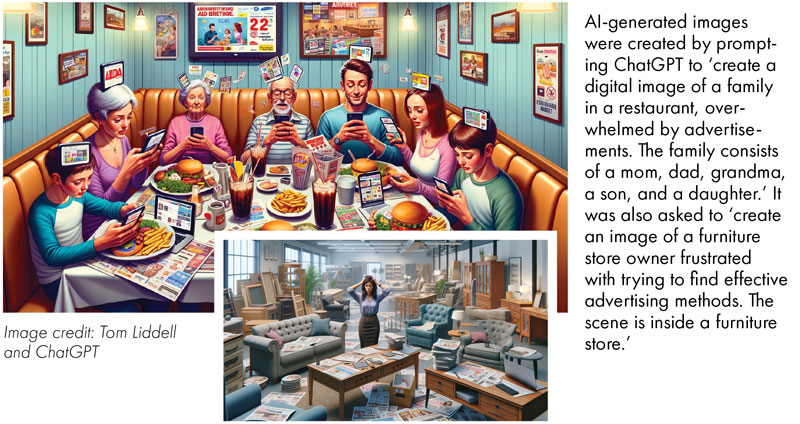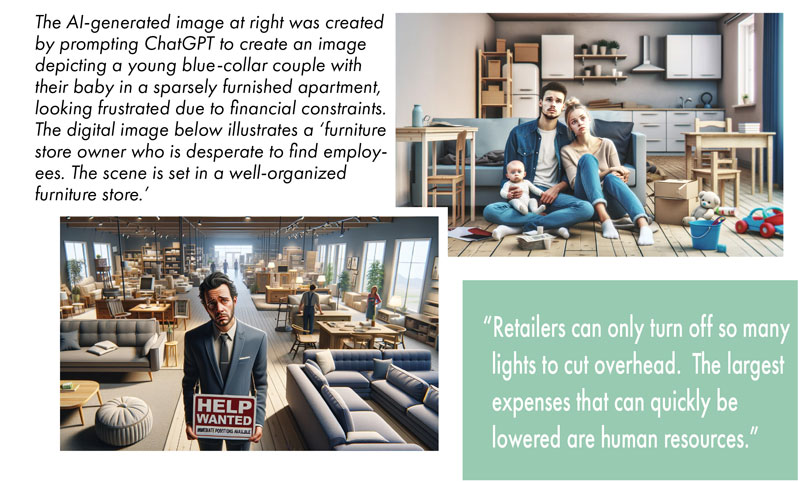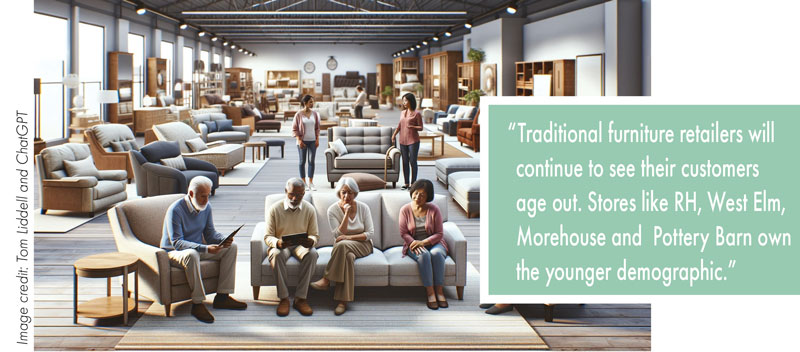Retailers will encounter some useful opportunities and more than a
few challenges in 2024. Here are some insights into what may be in store.
Interview with Tom Liddell, PFP
For his fourth annual assessment and retail forecast in Furniture World, Tom Liddell, director of Planned Furniture Promotions, Inc., identifies a few opportunities and more than a few challenges. Among these are retail traffic, the election cycle, and vendor issues. Liddell grew up in furniture retail, becoming a sales rep and manufacturing executive. An astute observer of the furniture industry, he prepared his comments after speaking with 40 of his highly successful retailer friends in trading areas across the country. He also used the AI platform ChatGPT to create images accompanying the text.
AI Opportunities 2024
Liddell observed that “AI is a big concern for our industry. Many retailers don’t know what to do with it, haven’t used it, and some are scared to death of it.”
It took him 20 minutes to create 24 images, some of which Furniture World chose to illustrate this article. “I used the paid version of ChatGPT,” he said. “It’s only 20 bucks a month. I didn’t need to enter highly detailed prompts. It’s a pretty basic skill to learn.”

Suggestion: Learn to Use AI. “Retailers can accomplish the same thing with a DALL-E account (https://openai.com/dall-e), which is free. Even the smallest retailers can benefit by generating images and having AI generate, rewrite and clean up ad copy or social media posts. The possibilities are limitless. The point is, if you’re not yet using it, spend some time learning about it. It’s here to stay.”
Vendor Diversification 2024
“We have a serious concern, based on PFP’s recent experiences, that retailers will continue to put too many of their eggs in one basket. Not much has been written about this issue, mainly because not many furniture retailers have shared their experiences.
“The exit of United and Klaussner left gaping holes in retailers’ programs, especially for those who relied more or less exclusively on these manufacturers. Even though it happened in 2022, the meltdown of United has had far-reaching implications for retailers. It was so bad that some have already liquidated. Others are either planning liquidations or are working to avoid liquidation due to cash flow problems.
“The downstream effect has been more than just lost orders. Retailers lost the profit, they lost the commissions, and many lost their credibility. Consumers felt like they were being lied to when told they couldn’t get their orders. And even though retailers shared articles and stories with them, people still didn’t believe it. They just wanted their furniture.
“During the pandemic, it made sense for retailers, especially larger ones, to transition from paying commissions on delivered to paying on written to retain their salespeople. That became a liability.
“And a few had their financing funded upfront. So when United and Klaussner disappeared, they couldn’t repay all the customers’ deposits they had used to fund store operations. Having already paid upfront sales commissions, retailers had to beg customers to reselect from new vendors they didn’t even have relationships with. Those who relied on special order lost 70 to 80 percent of their business and ran out of cash very quickly.”
Suggestion: Defensive Credit Checks. “Vendors have checked the financial stability of retailers before shipping goods since the dawn of time. In 2024, we’ve come to a point where it’s become necessary for retailers to research the financial stability of their vendors, especially if private equity firms own them. I’m just throwing that out as food for thought for Furniture World readers.”
Suggestion: Add Vendors. “Retailers have thought about diversifying the number of vendors they work with, but many have not acted on this impulse. Furniture retailers need to diversify their vendor list so they don’t have all their eggs in one basket. For those whose special order upholstery programs rely on one vendor, 2024 is a time to bring on board two at a minimum and maybe three or four.”
Liddell said that the moral of this cautionary tale is don’t wait for these kinds of issues that were catastrophic for some and serious for others to happen to you.
“For those whose special order upholstery programs rely on one vendor, 2024 is a time to bring on board two at a minimum and maybe three or four.”
Store Traffic 2024
“This next point is fairly brief but extremely important,” Liddell observed. “Lackluster store traffic is clearly the number one problem in our industry. Retailers are reporting reductions of 10 to 40 percent. Promotional stores have been the hardest hit, but it’s happening at every price point. We’ve spoken to clients who are spending significantly more on advertising than they normally would, and still bringing in less business.
Suggestion: Adjust Store Overhead. “Balancing spending with profitable revenue is the most important thing retailers can do in 2024. Even more important, if business is off, make immediate adjustments. Many retailers fear making necessary staffing cutbacks because they don’t want to lose team members. They either feel that it would be a liability when business conditions bounce back or resist out of a sense of loyalty. The problem is that either way, many retailers risk losing their business by doing so.
“It’s a situation liquidators frequently encounter. Here’s the usual scenario. A retailer calls us for a consultation. Their business might have dropped from four or five million dollars to two and a half million. They’ve hardly made any staffing cuts and can’t explain why.
“Retailers can only turn off so many lights to cut overhead, however, the largest expenses that can be quickly lowered are human resources. And, while it’s difficult, it’s important to bite the bullet, just like Fortune 500 companies do when revenue drops.
“Frequently, when we’ve helped clients decide who to cut, they are shocked that they don’t notice a difference in the level of service they’re offering their consumers.”

Consumer Debt 2024
“Consumer debt for these customers is at an all-time high. People with lower incomes as well as higher-income folks who’ve taken on too much debt are having trouble qualifying for financing. Furniture retailers face challenges right now, especially at the tertiary financing level, getting approvals of high enough credit lines.”
Suggestion: Address This Financing Issue. “Retailers should consider partnering with services that apply to multiple tertiary lenders simultaneously. We are speaking with a company called FirstApp, but there are others. Their services save time and embarrassment for poor credit customers who might otherwise need to apply and get turned down sequentially by more than one lender. Multiple tertiary financing companies respond almost immediately, providing information about how much they are prepared to loan, monthly payments and what the application fee and total exposure for the customer will be. Shoppers pick the deal they want and the process doesn’t ‘ding’ their credit. These services will be useful for furniture retailers in 2024.”
Advertising & the 2024 Election
Liddell noted that advertising costs more and is less effective than ever in the history of the furniture business.
“The 2024 election year,” he said, “will compound this issue for furniture retailers. Not only will ad rates potentially reach record highs, but buying ad space will be a challenge. That’s because political advertising may pre-empt furniture store advertising. It’s a legal requirement for broadcasters. Retailers will place ads, but that doesn’t mean stations will pick them up.“
Suggestion: Consider Hiring an Ad Agency. “Stores not currently buying through advertising agencies might want to consider doing so this year.
“Some agencies pre-buy spots, potentially offering better value and tying up the ad space. They purchase large amounts and then re-sell it.
“States that typically swing toward one party won’t be affected as much as those that are more politically competitive. However, every state will be affected because there will be primaries and the general election. Retailers should speak to their agencies about this issue and consider purchasing ‘Over The Top’ ads that deliver content via streaming services to various electronic devices.
“Advertising costs more and is less effective than ever in the history of the furniture business. The 2024 election year will compound this issue for furniture retailers.”
“Advertisers can use OTT to make targeted demographic buys, making it more difficult for viewers to skip spots. News and sports programming will continue to be highly effective because people tend to watch live, so there’s less chance they will skip commercials.
“OTT and other advertising mediums, such as targeted Google keywords, are smart choices for 2024 ad buys.”
Suggestion: Do Social Media Better. “Social media is potentially the number one form of advertising retailers can use, but very few do it effectively. It’s basically free, once the pages are built up and followers attracted. Until then, retailers need to pay for boosts to build an audience. Even so, it’s still a value.
“We recommend retailers focus on social media to engage with their communities and create fans of their pages. Don’t try to post ads on social media because it’s more effective for branding. That doesn’t mean stores can’t show product or talk about sales. But if they do, it has to be in a fun and exciting way.
“People will follow a retailer only if they want to know what that company has to say. Simple ideas include posting new products with photos taken in-store instead of factory-supplied images. Tell stories about products and relate how exciting it is to have them on the floor. Emphasize items that are new and different. Create and post short videos showing how these products can be used.
“Use social media to show that you participate in local activities and support local and professional sports teams and school bands. Honor the police or fire department with photos and perhaps offer members of these agencies special prices for limited periods.”
Liddell noted that even the smallest stores can use social media effectively. “While it might sound silly, Halls Furniture, a small store in Winchester, Tennessee, asked people to vote for the best pumpkin carved by their warehouse staff. They received hundreds of votes and lots of shares. It was just one of many creative ideas they’ve come up with for people to look at and consider. They have done a near-perfect job of establishing a nice following of close to 10,000 regular customers and Facebook viewers. Most of what they post is not self-serving, yet it does a phenomenal job of creating a powerful brand for their company.
“Furniture retailers can ask GPT-4 for many more social media ideas. That’s what I did. It provided an exceptional list, including before and after transformations, customer testimonials, user-generated content, and reviews from happy customers.
“So many retailers are still missing the boat on this extremely valuable medium. To do it right is a marathon, not a sprint. Don’t just build a Facebook page and create a few posts. Building that audience on Facebook, Instagram, and Pinterest takes time. I’ve found that hiring a third-party company to manage social media from afar doesn’t work. It takes somebody physically in the store who can take photos and tell the stories.”
Hiring & Retention 2024
“The retailers I spoke with to prepare for this interview,” said Liddell, “each identified their most significant challenge for 2024. Like last year, the number one challenge mentioned was recruiting and employee retention. They said that they can’t get quality people who want to sell because they don’t think of sales as a potential long-term career they can be proud of. Even though stores still pay sign-up bonuses, it’s still frustrating without an apparent solution. Some smaller retailers have told me that their employees have developed defiant attitudes. They know they are supposed to be there at 8:00 a.m. but might not arrive until 9:00 or 9:30. They are aware that they won’t get fired.”
Suggestion: Work Hard To Create Good Relationships. Liddell says he’s come across retailers in his career who are miserable jerks that nobody would want to work for. Sometimes, bad attitudes are a two-way street. “All I can suggest is to work hard to maintain respectful relationships with team members,” he advised.
Keeping Sane in 2024
“Interest rates and inflation have hit low-income consumers hard. New housing is a concern. Election years almost always bring conservative consumer attitudes toward buying. The biggest retailers are getting bigger. How can they deal with all these factors?”
Suggestion: Consider a Buying Group. “Buying groups can be a big help. They take a lot of work and responsibility off an owner’s plate and negotiate with vendors for discounts and rebates. Most provide a content-rich web option that offers an immediate turnkey e-commerce solution. Group rates on insurance programs, finance programs, meetings and performance groups provide a wealth of ideas and positive inspiration.”
“Vendors have checked the financial stability of retailers before shipping goods since the dawn of time. In 2024, we’ve come to a point where it’s become necessary for retailers to research the financial stability of their vendors.”
Demographic Considerations
“Traditional furniture retailers,” Liddell observed, “will continue to see their customers age out. Stores like RH, West Elm, Arhaus and Pottery Barn own the younger demographic. These retailers sell at high prices and enjoy significant margins. They are also picking up a significant share of older demographic groups.
“It’s a chicken-and-egg situation for many retailers. Traditional retailers may try to make their product lineup trendier to get that ‘cool’ factor, but it doesn’t work because their younger customers aren’t coming in to see those kinds of products.”
Suggestion: Reach Out With Effective Messaging. “Bringing in ‘cool’ new products must be accompanied by getting the message out to the right people that ‘you are not their parent’s furniture store.’
“The most effective way to do this, again, is through social media. We’ve seen stores achieve good results, bringing in new customers who buy stylish new items.”

Borrowing to Fund Operations
“It’s common for retailers to have credit lines that they’ve maintained with lenders. Let’s say it’s $300,000. When business takes a downturn, I’ve seen those credit lines go up to $1.4 million or $1.5 million seemingly overnight. That’s a dangerous situation because when they borrow, repayments tend to come out of their pockets, not revenue.”
Suggestion: Borrow Only For The Right Reason. “Don’t try to borrow into success. Take care to ensure that borrowed funds bring in additional business to pay for those loans.”
Conclusion
Liddell said he hopes that retailers who read this article will avoid the pitfalls and take advantage of every available opportunity. “As always,“ he related, “I’m glad to speak with Furniture World readers about any of my comments in this interview or issues they foresee in 2024. My contact information can be found at www.pfpnow.com.”
About Tom Liddell: Tom Liddell, director of Planned Furniture Promotions, Inc., a company that has planned and implemented thousands of sale promotions for national, regional and local retailers of all sizes that are interested in quitting business, retiring, raising cash, and achieving other urgent goals. PFP applies its unparalleled expertise and offers a broad range of services to help retailers maximize value including purchasing inventory using its substantial buying power, management, sales staffing, advertising, financing, and other critical areas.
Russell Bienenstock is Editor-in-Chief of Furniture World Magazine, founded 1870. Comments can be directed to him at editor@furninfo.com.